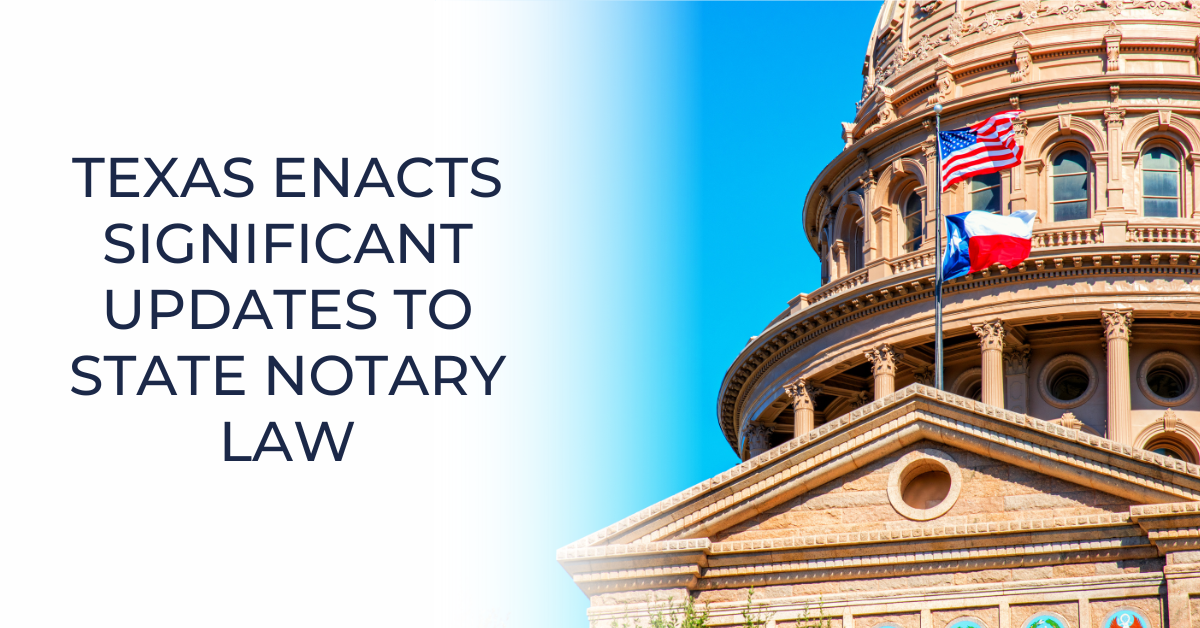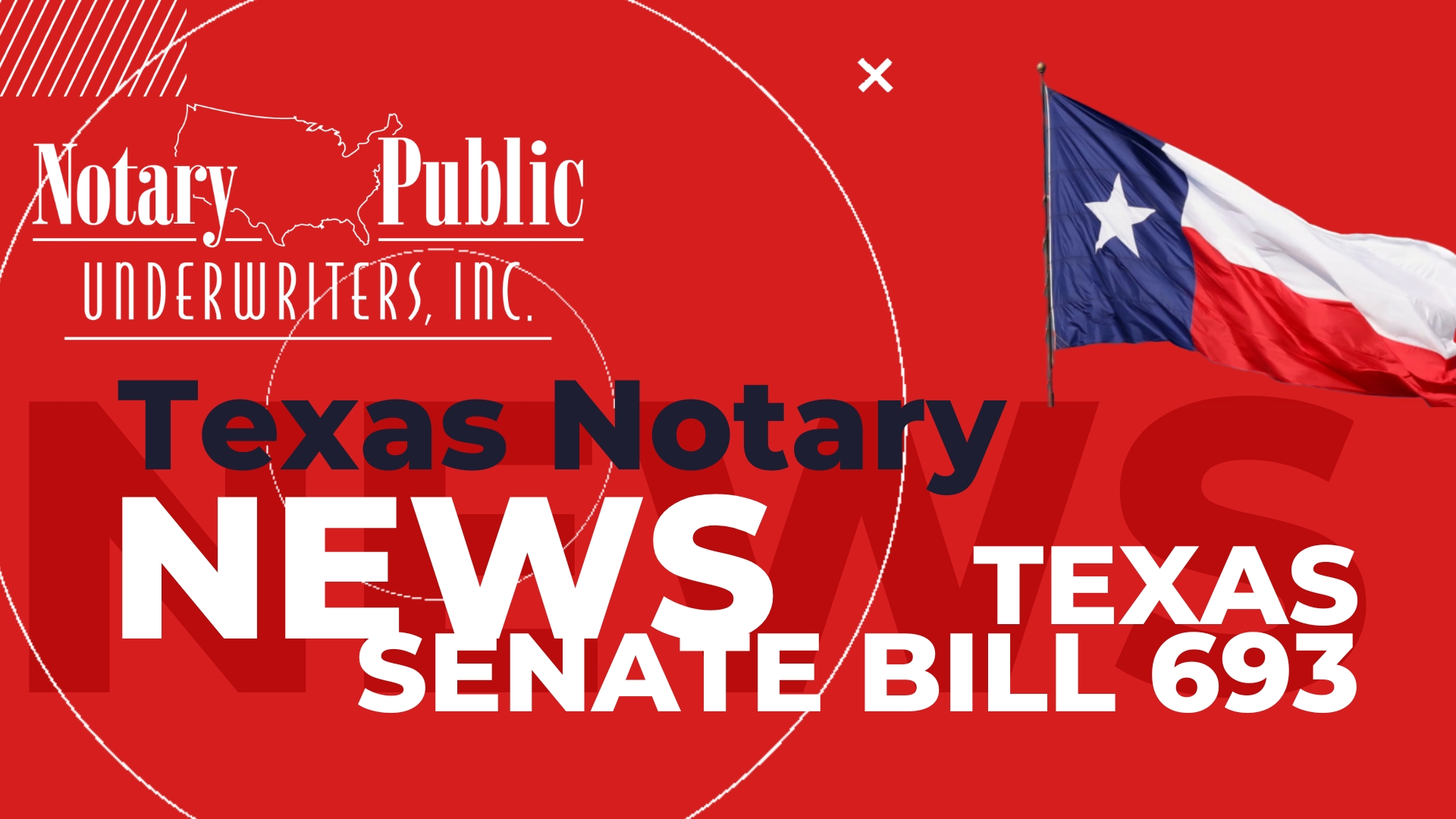Notary Public Underwriters Blog
Texas Enacts Significant Updates to State Notary Law
- Details
- Published: August 27, 2025

The Lone Star State has enacted Senate Bill 693, which brings significant change to Texas’ notary public laws and touches, in some way, all of Texas’ 484,000-plus notaries public.
When the Law Takes Effect
Senate Bill 693 is effective September 1, 2025, but the law changes in it apply only to people whose notary public application for appointment or reappointment is submitted on or after January 1, 2026.
The bill also clarifies that the statutes affected by the bill remain applicable, with their pre-Senate Bill 693 wording, to Texas notaries who applied or apply for their new or renewal commission before January 1, 2026.
Senate Bill 693 — Applicability
|
If you submitted or will submit your notary public application (appointment or reappointment) in 2025, then the law changes made in Senate Bill 693 do not apply to you (during your current commission term). |
If you submit your notary public application (appointment or reappointment) on or after January 1, 2026, then the law changes made in Senate Bill 693 do apply to you. |
Senate Bill 693 further requires that, no later than January 1, 2026, the Secretary of State shall adopt administrative rules necessary to implement the law changes made by this new legislation.
Key Changes in Senate Bill 693
Senate Bill 693 affects these key areas of Texas notary law and practice:
Notary Education
- The Secretary of State must establish—by administrative rules as authorized under Section 406.023, Government Code—notary education requirements for new and renewing notaries. The notary education requirements will be limited to no more than two hours of training for both new and renewal commission applicants.
- The rules must require the Secretary of State to establish and offer education and continuing education notary courses, for which the Secretary will be allowed to charge a reasonable fee.
- The rules must require that the mandatory notary education and continuing education training may only be completed through a course established and offered by the Secretary of State.
- The rules may not require a person appointed as a notary public before September 1, 2025, to complete education required for initial appointment.
- The rules must be adopted (final) no later than January 1, 2026.
Texas Government Code Section 406.006 (qualifications for a notary public commission) is amended to reflect the notary education requirements created by Senate Bill 693.
Additional Changes
Senate Bill 693 makes these additional changes to current Texas notary law:
- “Good cause” definition and the journal requirement. “Good cause” is the Secretary of State’s standard for rejection of a notary public application, or revocation of an existing commission. Senate Bill 693 modifies the statutory description of “good cause” to include a Texas notary’s failure to maintain records of notarizations (a journal) as required by Gov’t Code Section 406.014.
- (New) Government Code Section 406.0091. Establishes that a person commits an offense if, as a notary public, the person “performs a notarization” but failed to require personal appearance of the individual for whom a notarial act is meant to be performed.
Provides a detailed explanation of when a person “personally appears” before a notary public (for notarial acts other than a Texas online notarization, as well as for Texas online notarizations). Establishes that failure to require personal appearance is a Class A misdemeanor, which rises to a state jail felony if the document involves the transfer of real property or any interest in real property.
- Protection for a notary who unknowingly relied on fake signer identification. Senate Bill 693 creates an affirmative defense to prosecution for a notary who accepted, from a present individual, an apparently valid (but actually fake) proof of identification that identified the present individual as the signer, grantor, maker or principal for whom the notarization was intended to be performed. The bill also defines “personally appears before a notary public” to mean an individual’s physical appearance in a notary’s presence for notarizations other than an online notarization; as well as appearance by means of online notarization technology as allowed under Texas law.
- Longer mandatory retention period for a notary’s records of notarial acts (record book, journal). Senate Bill 693 mandates a new, longer retention period for a notary’s records of notarial acts. They must be kept until the 10th anniversary of the date of notarization (the last one entered in the book).
Related Article(s)
Texas Notaries: Know Your Allowable Fees and Other Requirements
Texas Notaries: How to Correct a Past Entry in Your Notary Journal
Can I Notarize a Signature on a Handwritten Document?
Fighting Fraud: Why Notaries Should Avoid Using Signature Stamps
Tips to Protect Your Notary Stamp and Journal
How to Get More Notary Business Part 1: Optimize Your Marketing
How to Avoid Common Mistakes During a Notarization
When Can a Notary Use Personal Knowledge to Identify a Signer?
Does a Notary Need to See the Entire Document When Notarizing?
Can a Notary Correct a Mistake on the Notarial Certificate?
Notary FAQs: Essential Answers for Everyday Scenarios
Top Ten Mistakes That Notaries Make
Can a Notary Notarize a Family Member's Signature?

